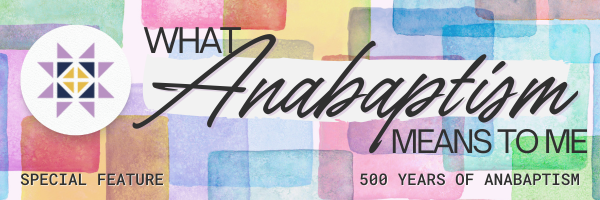Editor’s Note: This profile is part of a series of articles introducing the three board members joining the Mosaic Conference board in 2026.

Jenny Fujita comes to the Mosaic Mennonite Conference Board as an at-large member with a deep love for the Mosaic community and a commitment shaped by years of listening, discernment, and collaborative leadership.
Her journey toward board service began through serving as a co-facilitator of Mosaic’s Listening Task Force in 2022, where she worked alongside pastors and leaders from across the Conference to co-lead a listening process and review of Mosaic’s relationship with Mennonite Church USA. Over four weeks, the task force listened to voices representing more than 8,500 Mosaic members, 150 credentialed leaders, over six language groups, from 64 congregations, 27 Conference-Related Ministries, and Mosaic staff members across six states.
“It was a gift to hear the voices of so many of our siblings in Christ,” Fujita reflects. “We truly are a mosaic.”
That experience led to her role on the Pathway Steering Team, where Fujita spent two years helping envision how Mosaic would build our future together. As those efforts begin to bear fruit now, Fujita sees this season of Mosaic’s life as pivotal, challenging, and hopeful.
“I’m looking forward to continuing to discern the Holy Spirit’s will for Mosaic and to collaborate with the growing Mosaic family in the years ahead,” Fujita says.
Fujita is a member of Blooming Glen (PA) Mennonite and previously served for several years as pastor of Upper Milford (PA) Mennonite. She describes that season as one of the most meaningful experiences of her life.
“Upper Milford is a small but very active church,” she says. “They taught me that the size of a congregation has no bearing on its faithfulness or mission. Small can indeed be mighty when a church is congregationally led and everyone plays a role in God’s kingdom work.”
Preaching has long been central to Fujita’s ministry. While Blooming Glen offered her the first opportunities to preach, Upper Milford provided the space to deepen and refine that call.
“Preaching is storytelling that helps both listeners and the storyteller fall more deeply in love with our God of love,” Fujita reflects. “Writing and delivering sermons is a form of worship and a sacred collaboration with the Holy Spirit. I now see preaching as my primary ministry”
Fujita serves as an itinerant preacher, offering sermons at Mosaic congregations and beyond, when she is asked. This includes churches of other denominations and multidenominational gatherings, both in person and online.
“Preaching itinerantly helps ensure that I’m sharing God’s good news to and with all people, not just those I know or who share our Anabaptist values,” explains Fujita. “Our Anabaptist essentials are for everyone.”
Outside of itinerant preaching and work with Mosaic, Fujita has led a community relations business on the island of Kaua‘i for more than 25 years, established during the years she lived there (1994-2010). The hard work and dedication of her Kauai business partner and colleagues keep the business thriving and give Fujita space to focus on ministry in Pennsylvania.
Fujita grew up in Puerto Rico, where her family owned an Italian restaurant. She later moved to Bucks County, PA and graduated from Pennridge High School. As a teenager, she once dreamed of becoming a forensic pathologist, and while she was supposed to be volunteering at Grand View hospital, she interned in the morgue.
We are grateful for Fujita’s gifts, perspective, and faithful presence, and we look forward to her leadership on the Mosaic Mennonite Conference Board.
Mosaic values two-way communication and encourages our constituents to respond with feedback, questions, or encouragement. To share your thoughts or send a message to the author(s), contact us at communication@mosaicmennonites.org.




